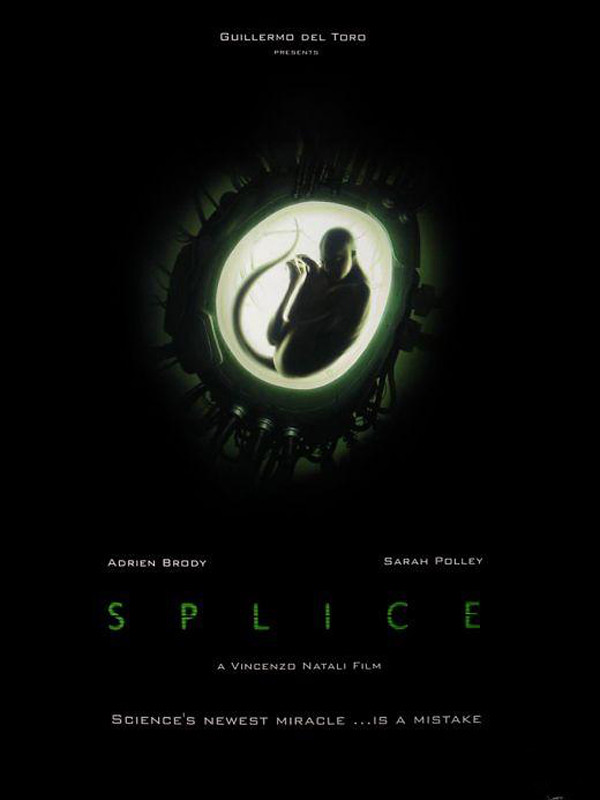
I will tell you up front. I'm going to do a really lousy job of not sounding arrogant here. I'm going to write about a film that, were I a critic of some sort and were I obliged to rate this film on some kind of academic A through F grading scale, I would rate a B or a B+. I am going to write a (hopefully, please-let-this-be) brief ramble about a film that is ambitious enough and interesting enough to be a candidate for a solid A grade, and is one of the most interesting and provocative films I've seen this year. And in telling you why it didn't make that A grade, I'm going to talk about why it failed me, as though I am someone with either the status or wisdom to warrant the position of the film owing me something. In other words, I'm going to do what I always do on my little blog here.*
Splice gets right a lot of things that a lot of other films don't try to get right. It gets right the anxiety of first-time parenting and first-time pet-owning through metaphor and parallel. It develops a character from literally zero, and it (almost) never vilifies its monster with cheap black-and-white morality. And it's crypto-biologically creepy at times in an approaching-Cronenbergian way that too few films are bold enough to go for. If I were to describe to you the plot, beat by beat and in some detail, I think you'd say, that's a pretty good plot; that's smart and clever; the stakes are high and thematically interesting; I think I would like this movie and I wish you hadn't ruined every single plotpoint for me with your in-depth summary. But if you were to watch the film, and you were me (or like me in sufficient ways) I think you'd say that the three main plots (Dren's development and interaction with the scientists; Clive and Elsa's relationship to each other; the scientific thinktank backing them and expecting results) are so disconnected in tone and pacing that they sometimes feel like different movies crammed together. I think you'd site scenes like Clive playfully dancing with Dren immediately after a confrontation that ended poorly for him with his, er, handler. I think you'd point out how Elsa's constant emotional back-and-forth feels less like the mania they're suggesting she suffers from and more like a ping pong ball bouncing between maternal figure to mad scientist whenever the script calls for it.
All the beats and scenes are bold and interesting and the story does what I'd want that story to do, but the characters never feel like they are reacting to what happens so much as being shuttled into the next scene with the next set of emotional baggage, often forgetting or skewing or overdoing what they would normally carry with them from the previous scene. (This isn't the actors' fault; the three leads are pretty great, especially Polley and Brody... the script just never feels smooth and organic.) The action moves along at a pretty good clip and once the ante starts going up it never really stops, but the characters and their emotional trajectories are herky-jerky and wildly inconsistent.
That is, until act three. I have to admit, at that point I think the plot train jumped the rails onto another track altogether (or if you prefer, the needle skipped to another song?) -- very much like act three of Danny Boyle's otherwise awesome film Sunshine -- and started dabbling in a different kind of movie for a while: the plot, pacing, and tone started making the same kind of right-angle turns that the characters had been making all along. Act three needed to include [BIG SPOILERS] a gender-changing Dren, a sexual encounter leading to a pregnancy, and probably Clive's demise. But it didn't need a prolonged chase, or a couple of meaningless deaths, or a monster prowling a moonlit wood (or was that a swamp?). I kind of like the idea that we acknowledge that she/he was a monster all along, a literal abomination, and that the other shoe had to drop eventually; but I don't like the idea that we do it by changing the movie we were watching so god-damn suddenly into another monster movie.
To be fair, though, just about everything else about it I really, really liked. I know I didn't convey a lot of what I liked in my bash-heavy rant here, but I'm not here to give a fair and balanced summary or review of the film. This isn't that kind of a thing. I'm just recording my thoughts, and here my thoughts were that act three jumped the rails a bit, and that the characters felt a little more puppet-ish than human-ish -- and it's too bad because otherwise this is a really intriguing story with a cool, smart plot with very neat effects in a strangely inviting little world. I wouldn't even mind a sequel to follow, something akin to the Alien series's overarching narrative. But it's not, by any stretch, without its flaws.
Another film, other than Sunshine, about which I could have said almost the exact same things I've said here? Cube, the first film by Splice's director. For that matter, Cube also has an open-ended conclusion and did in fact spawn (heh) a sequel that I've never seen and heard mixed-but-not-all-bad things about. So whether it's deliberate or incidental, this may just be the Natali style.
Seen at the Regal Lloyd Center.
* as a sidenote, I just read half a page written by David Foster Wallace before deciding to sit down and write this, and look at me now. Complicated, multi-parenthetical and self-referential sentences, extended footnotes, rambling prologues. Holy shit, it's infectious. Perhaps you should close this page while you still can, or I can't promise that you won't start doing it, too.

No comments:
Post a Comment